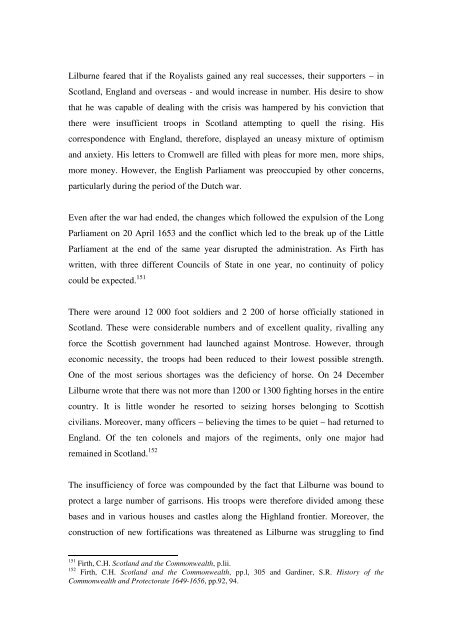The Glencairn Uprising, 1653-54 Helen Baker Department of ...
The Glencairn Uprising, 1653-54 Helen Baker Department of ...
The Glencairn Uprising, 1653-54 Helen Baker Department of ...
Create successful ePaper yourself
Turn your PDF publications into a flip-book with our unique Google optimized e-Paper software.
Lilburne feared that if the Royalists gained any real successes, their supporters – in<br />
Scotland, England and overseas - and would increase in number. His desire to show<br />
that he was capable <strong>of</strong> dealing with the crisis was hampered by his conviction that<br />
there were insufficient troops in Scotland attempting to quell the rising. His<br />
correspondence with England, therefore, displayed an uneasy mixture <strong>of</strong> optimism<br />
and anxiety. His letters to Cromwell are filled with pleas for more men, more ships,<br />
more money. However, the English Parliament was preoccupied by other concerns,<br />
particularly during the period <strong>of</strong> the Dutch war.<br />
Even after the war had ended, the changes which followed the expulsion <strong>of</strong> the Long<br />
Parliament on 20 April <strong>1653</strong> and the conflict which led to the break up <strong>of</strong> the Little<br />
Parliament at the end <strong>of</strong> the same year disrupted the administration. As Firth has<br />
written, with three different Councils <strong>of</strong> State in one year, no continuity <strong>of</strong> policy<br />
could be expected. 151<br />
<strong>The</strong>re were around 12 000 foot soldiers and 2 200 <strong>of</strong> horse <strong>of</strong>ficially stationed in<br />
Scotland. <strong>The</strong>se were considerable numbers and <strong>of</strong> excellent quality, rivalling any<br />
force the Scottish government had launched against Montrose. However, through<br />
economic necessity, the troops had been reduced to their lowest possible strength.<br />
One <strong>of</strong> the most serious shortages was the deficiency <strong>of</strong> horse. On 24 December<br />
Lilburne wrote that there was not more than 1200 or 1300 fighting horses in the entire<br />
country. It is little wonder he resorted to seizing horses belonging to Scottish<br />
civilians. Moreover, many <strong>of</strong>ficers – believing the times to be quiet – had returned to<br />
England. Of the ten colonels and majors <strong>of</strong> the regiments, only one major had<br />
remained in Scotland. 152<br />
<strong>The</strong> insufficiency <strong>of</strong> force was compounded by the fact that Lilburne was bound to<br />
protect a large number <strong>of</strong> garrisons. His troops were therefore divided among these<br />
bases and in various houses and castles along the Highland frontier. Moreover, the<br />
construction <strong>of</strong> new fortifications was threatened as Lilburne was struggling to find<br />
151 Firth, C.H. Scotland and the Commonwealth, p.lii.<br />
152 Firth, C.H. Scotland and the Commonwealth, pp.l, 305 and Gardiner, S.R. History <strong>of</strong> the<br />
Commonwealth and Protectorate 1649-1656, pp.92, 94.
















